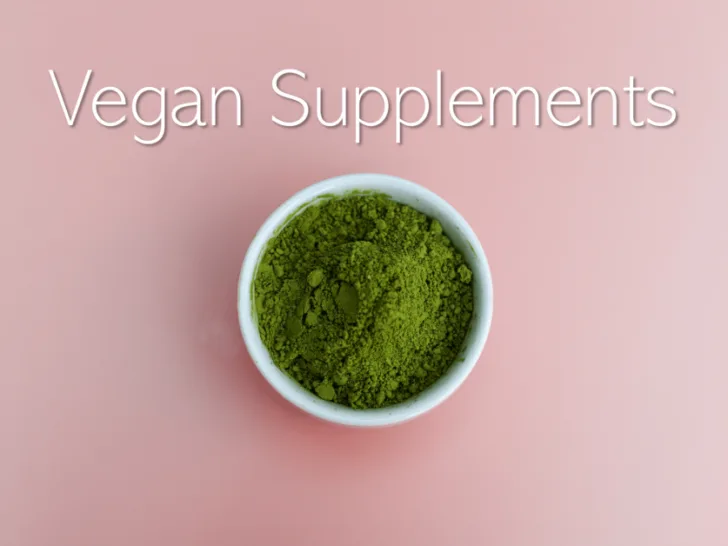Some of the links in this post are affiliate links. This means if you click on the link and purchase the item, we will receive an affiliate commission from the vendor at no extra cost to you. These business relationships allow us to keep bringing you great EatMoveHack content. All opinions remain our own.
If you were brought here searching for vegan supplements, you probably know a good amount about veganism and the lifestyle/diet itself. If you go to this page in a different way, here is a brief history and introduction to veganism:
The Vegan Diet: Introduction
In the short lifespan of human history on the earth, people have managed to adapt to a variety of eating practices. Humans no longer must rely on the survival tactics of making a meal out of whatever food is available. Now more than ever, people are abandoning the consumption of animals altogether, merging lifestyle practices with cuisine selection. Rarely has the focus been on complete animal abstinence, which are the basic fundamentals of the modern-day vegan, a popularizing course of vegetable dependency that has seen restaurants and celebrity chefs emerge who cater specifically to its participants. It has been estimated that vegans now make up about 2% of the population in the United States.
Vegan Supplements
Because of today’s improvements with the accessibility of nutritional supplements, it is possible for vegans to maintain their diet without the unwanted fortuity of going back to meat. The vegan supplements listed can be easily obtained online and in health food stores, and are highly recommended by experienced vegans for their all-in-one nutritional properties. Some vegan supplement products will feature multiple vitamins in just one tablet. In this case, a multivitamin will have two or more of the necessary vitamins needed for vegans.
Protein Powders
Protein is one of the most necessary chemicals required for the body to properly function. Unfortunately, a vegan diet lacks the amount of protein that is recommended by the United States Department of Agriculture. Protein produces collagen, a compound that helps to combat aging and weakened immune systems. For this reason, protein powders with high concentrations of collagen are advised.
Probiotics
Probiotics consist of healthful bacterial strains that improve the digestive system’s ability to absorb food, including the supplements that are taken by vegans. Since probiotics are found in fermented yeast extracts, they can safely be consumed without the fear of eating a meat derived organism. Some foods such as sour kraut have high concentrations of probiotics.
Vitamin B-12
Regarded as one of the most important vitamins, B-12 is made entirely of microorganisms, with few plants having the ability to produce it. Vitamin B-12 supplements can prevent damage to the central nervous system, and maintain healthy chemicals in the brain cells such as serotonin. The synthetic form of vitamin B-12 most used in supplements is Cyanocobalamin and is also a common name for many brands that advertise the compound.
Long-Chain Omega-3 Supplements
Commonly found in seafood, long-chain omega-3 fatty acids are beneficial to fighting high blood pressure, depression, and generate improved cognition. They are often sold at health stores under the label of containing ALA, EPA, and DHA, the latter of which is sometimes derived from seaweed. Omega-3 supplements can be found in tablet form utilizing extracted fatty acids from fish or synthetically manufactured into vitamins without the use of any seafood sources.
What The Supplements Do
Vegans must ingest the vitamins that are abundantly found in meat, even if no meat products are consumed. Our bodies cannot depend on plant life alone to stay healthy. Collectively, each of the vegan supplements listed can prevent vitamin deficiencies from happening, most of which can damage internal organs such as the liver, kidneys, and heart. The digestive system depends heavily on vitamins, and the brain produces stress-fighting chemicals with their combined help. The body’s lymph nodes, a part of the immune system, cannot properly work if there is not enough nutritional content being eaten. Nevertheless, the oversell well-being of both physical and mental abilities are made better with vitamin and minerals, increasing the chances of a long life.
Why You Need Supplements
Everyone needs vitamins, no matter the diet, size, or age of an individual. The focus has been on vegans being aware of the dangers accompanied by vitamin deficiency, as they are some of the likeliest groups of people in the world to be diagnosed with it. A vegan will never see the fruits of their heavy plant consumption if the proper vitamins are never used. It could also lead to hospitalization and the added nuisance of expensive medical bills in a late attempt to undo the damages that will inundate a person with a low concentration of essential vitamins in their system.
Vegan Diet
 As a dietary choice, a simplified meaning of veganism is the avoidance of all known sources of meat such as poultry, beef, and seafood. Substances that are derived from animals are also withheld from consumption, most notably dairy products, and eggs. In comparison, a vegetarian diet will generally include milk and eggs. Because of the potential lack of protein that veganism is known for, health nutritionists often stress the importance of including vegan supplements into daily eating habits.
As a dietary choice, a simplified meaning of veganism is the avoidance of all known sources of meat such as poultry, beef, and seafood. Substances that are derived from animals are also withheld from consumption, most notably dairy products, and eggs. In comparison, a vegetarian diet will generally include milk and eggs. Because of the potential lack of protein that veganism is known for, health nutritionists often stress the importance of including vegan supplements into daily eating habits.
A vegan diet has notably high amounts of fiber, potassium, folic acid, vitamin E, and vitamin C. It has been shown to decrease the likelihood of heart disease and certain cancers. Beginning dieters commonly speak of having improved energy and metabolism. Weight loss can be achieved slightly easier for a vegan that combines regular exercise into their plant-based continuance. However, for the sake of reducing the harmful after-effects of uninformed vegan practice, extensive research is advised prior to undertake such changes in one’s typical eating decisions. As with all nutriments, veganism has clear advantages and a few risks. Caution should be taken when proceeding to begin a vegan diet, which is different from other modern diet trends that carry fewer direct health impacts.
Deficiencies It Causes
Due to the lack of certain vitamins that are associated with vegan foods, vegan supplements must be taken in order to maintain the proper balance of vitamins D, B12, protein, cholesterol, calcium, omega-3 fatty acids, and saturated fat. Without these essential nutrients, life-threatening deficiencies can occur. Zinc and iron can also be a concern due to their low presence in plants. Since vegans do not eat seafood and eggs, they tend to have lower concentrations of eicosapentaenoic and docosahexaenoic acid in their bloodstream, also known as EPA and DHA. They are vital for the healthy function of the heart, eyes, and brain cells.
Calcium and Vitamin D deficiency can lead to many serious health issues. Osteomalacia, the weakening and softening of the skeletal system, is a direct result of having too little of the aforementioned substances in the body. It can lead to rickets in children, making fractures easier and even body deformities more likely to develop. Although sunlight is a natural remedy to combat low levels of vitamin D, it should not be depended upon by vegans as a reliable method of prevention, particularly in children.
Vegans Can Remain Vegans
As mentioned, vegan supplements can prevent a plethora of serious and life-threatening illnesses and deficiencies from happening. Vegetables do not contain significant sources of healthy fats. While there is technically nothing wrong with consuming a large amount of plant material (unlike the associated cardiovascular risks of meat overconsumption), meat does include certain vitamins that are useful to the human body, being that humans have an omnivorous record of eating green and animal food. Recognizing the latency for human forgetfulness when taking non-prescribed vitamins, doctors will usually check up on their vegan patients to make sure that no doses are missed.
Veganism will remain a healthy option for years to come, and it’s supplement demands will probably become much easier to maintain in the future. Yet for now, they perform a vital task and are a necessity for every vegan. For the people who are unable to acquire these dietary supplement obligations, it is recommended that they consider waiting to begin their journey into the world of plant reliant cuisine. Regardless, most should have no problems obtaining them, as brands have become much more affordable than in recent year’s past. As the trend continues to grow with not only millennials, but the elderly seeking alternatives to prescription dependency, the vegan way of eating and living will surely bring about positive health results for years to come.





